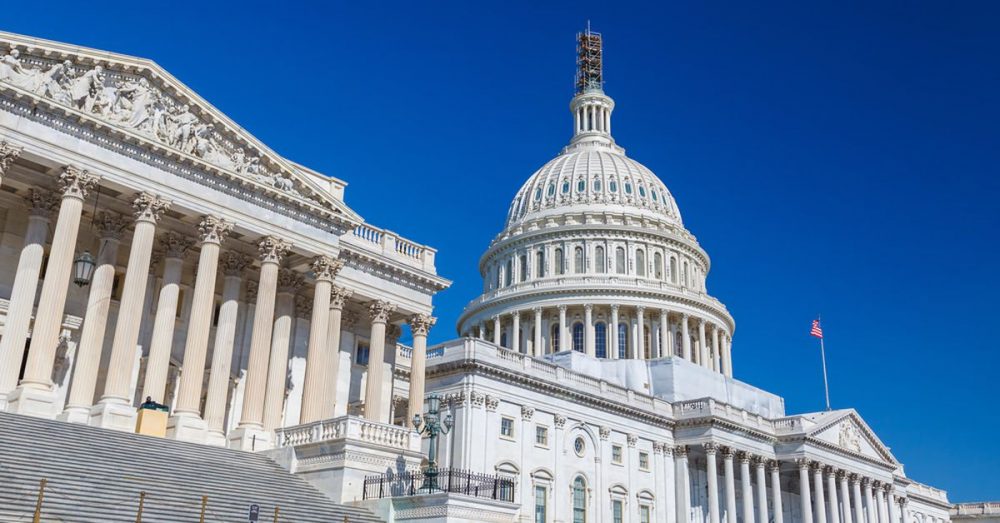The swift and surprising collapse of FTX last week continues to send shockwaves across the crypto industry and beyond – and Capitol Hill is not immune.
Former FTX CEO Sam Bankman-Fried was, until last week, a major political donor – he gave $5.2 million to U.S. President Joe Biden’s presidential campaign, and spent another $40 million supporting mainly Democratic candidates ahead of the November midterm elections – and an influential figure in Washington, D.C.
Bankman-Fried regularly met with regulators and lawmakers, weighing in on how the crypto industry should be regulated. He was a vocal supporter of one bill, in particular: the bipartisan Digital Commodities Consumer Protection Act (DCCPA), a still-in-progress bill backed by Senate Agriculture Committee chairwoman Sens. Debbie Stabenow (D-Mich.) and ranking member John Boozman (R-Ark.).
In 2022, Bankman-Fried directly donated at least $26,600 to Stabenow and $8,700 to Boozman. In June, he also donated $16,600 to Sen. Kirsten Gillibrand (D-New York), who signed onto the bill in September. In 2021, he donated $5,700 to Sen. Cory Booker (D- New Jersey), another of the bill’s co-sponsors.
That bill sits at the intersection of the existential question now facing the crypto industry: why did FTX collapse and how can repeats be prevented? FTX was a centralized exchange, a single point of failure – that did indeed fail, seemingly because of choices made by Bankman-Fried – in the crypto ecosystem.
Many crypto purists, on the other hand, argue this is a moment to double down on crypto’s origin story – which critics of the DCCPA argue the bill would undermine. Born in the wake of the 2008 financial crisis, Bitcoin was proposed as a decentralized way of running a financial system. Today, that idea lives on in decentralized exchanges (DEXes) like Uniswap and the rest of decentralized finance (DeFi).
DCCPA’s detractors say it would effectively kill DeFi in the U.S. by making it impossible for large players like Uniswap to comply – which entrenching the centralized exchanges like Bankman-Fried’s own FTX. The argument is basically that the regulatory requirements outlined in the latest draft of the bill (posted to GitHub by Delphi Labs general counsel Gabriel Shapiro) amount to a de-facto ban on DeFi.
In the wake of FTX’s collapse and Bankman-Fried’s subsequent fall from grace, opponents of the bill have proclaimed the DCCPA to be “dead” – which lawmakers, including the bill’s sponsors, have pushed back on.
In a statement issued on Nov. 10, Boozman said the collapse of FTX only reinforced the need for more federal oversight of the crypto industry.
“Chairwoman [Stabenow] and I remain committed to advancing a final version of the DCCPA that creates a regulatory framework that allows for international cooperation and gives consumers greater confidence that their investments are safe,” Boozman said.
With his statement, Boozman joined a bipartisan group of lawmakers including Sen. Cynthia Lummis (R-Wyo.), Sen. Elizabeth Warren (D-Mass.) and Sen. Sherrod Brown (D-Ohio), who have expressed concern about the collapse of FTX and the need for crypto regulation.
As one of the most fully-formed pieces of potential crypto legislation, it seems the DCCPA is not, in fact, dead – despite the shadow cast over it by Bankman-Fried’s ruined legacy.
Bringing crypto into the regulatory fold
The DCCPA aims to amend the Commodity Exchange Act (CEA) to give the Commodity Futures Trading Commission (CFTC) oversight of the crypto spot market. Under the DCCPA, crypto broker-dealers would be required to register as such with the CFTC, and submit to oversight from the federal regulator.
The bill can be roughly divided into two sections: requirements for “crypto commodity platforms,” which includes brokers, dealers, custodians, and exchanges, and requirements for the CFTC.
Crypto commodity platforms, for their part, would be required to maintain a relationship with the CFTC similar to other commodity dealers. For example, they would need to keep good records for at least five years, share information with the CFTC upon request, appoint a chief compliance officer, and submit to provisions that protect against “fraud, deceit, and manipulation.”
The DCCPA also ensures that crypto commodity platforms are required to have adequate financial resources, to hold customer funds “in a manner that minimizes the risk of loss or of unreasonable delay in access to the customer property.” Commingling of customer funds with the broker-dealer’s assets is strictly prohibited (something







